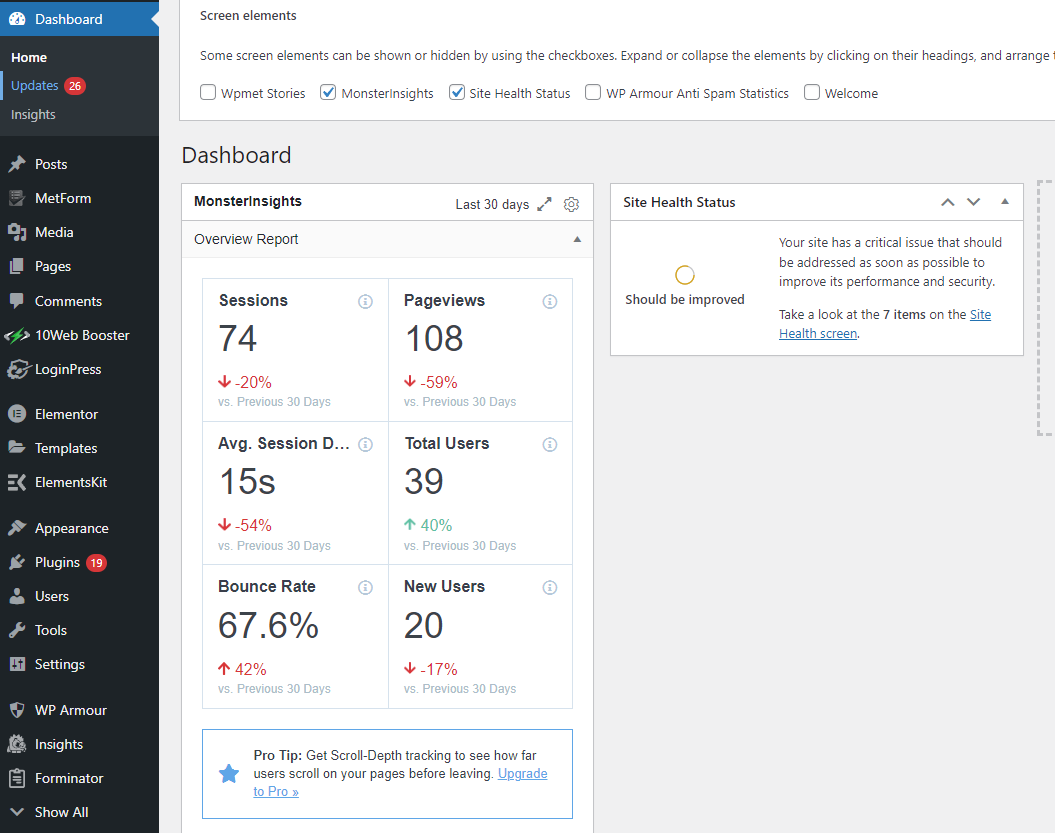
We are here. We not just do build website but we also have partnetship with leading hosting providers to fully give a great service to our customer. We will assist you for that. All you have to do is the payment. One payment is completed, we will do our part from building your site to connecting your domain and make your website live to the internet.
WordPress is a widely used content management system (CMS) that simplifies website creation. Its popularity stems from its user-friendly interface and extensive plugin ecosystem.
Boost your site’s speed by optimizing images, leveraging browser caching, using a content delivery network (CDN), minimizing plugins, and choosing a reliable hosting provider with good server performance.
No, you don’t necessarily need coding skills. WordPress provides a user-friendly platform, and many tasks can be accomplished without coding. However, some customization may require basic HTML, CSS, or PHP knowledge.
Plugins are additional software components that enhance the functionality of your WordPress site. They are crucial for adding features, improving performance, and ensuring security.
Consider your website’s purpose, design preferences, and functionality requirements when selecting a theme. Ensure it is responsive, well-coded, and compatible with the latest WordPress version.
Yes, regular updates are crucial for security, performance, and compatibility. Outdated versions may expose your site to vulnerabilities, and incompatible plugins can lead to functionality issues.
Yes, you can migrate your website to WordPress. Various tools and plugins simplify the process. Ensure you have a backup and follow proper migration steps to avoid data loss.
Dont worry! We at JC Webdesignph will assist you on purchasing your domain and configure it to point on your website. All you have to do is managed the payment. One you have entered or completed the purchased we will do our part to connect it to your website.
Optimize your site by using SEO-friendly themes, creating quality content, optimizing images, using SEO plugins, and ensuring proper permalinks. Regularly update your sitemap and monitor keyword usage.
Enhance security by using strong passwords, limiting login attempts, installing a security plugin, keeping themes and plugins updated, and regularly backing up your website.
Troubleshoot by deactivating plugins, switching to a default theme, checking for conflicting code, and reviewing error logs. Online forums and community support are also valuable resources for problem-solving.
Yes, you can add an online store using plugins like WooCommerce. WooCommerce seamlessly integrates with WordPress, providing a comprehensive solution for e-commerce functionality on your site.
WordPress.com is a hosted platform, while WordPress.org provides the open-source software for self-hosted websites. With WordPress.org, you have more control over your site, including the ability to use custom themes and plugins.
Backup your site regularly using plugins or your hosting provider’s backup tools. This ensures that in case of data loss or a website issue, you can restore your site to a previous state, minimizing downtime and potential data loss.
WordPress is a widely used content management system (CMS) that simplifies website creation. Its popularity stems from its user-friendly interface and extensive plugin ecosystem.
Boost your site’s speed by optimizing images, leveraging browser caching, using a content delivery network (CDN), minimizing plugins, and choosing a reliable hosting provider with good server performance.
No, you don’t necessarily need coding skills. WordPress provides a user-friendly platform, and many tasks can be accomplished without coding. However, some customization may require basic HTML, CSS, or PHP knowledge.
Plugins are additional software components that enhance the functionality of your WordPress site. They are crucial for adding features, improving performance, and ensuring security.
Consider your website’s purpose, design preferences, and functionality requirements when selecting a theme. Ensure it is responsive, well-coded, and compatible with the latest WordPress version.
Yes, regular updates are crucial for security, performance, and compatibility. Outdated versions may expose your site to vulnerabilities, and incompatible plugins can lead to functionality issues.
Yes, you can migrate your website to WordPress. Various tools and plugins simplify the process. Ensure you have a backup and follow proper migration steps to avoid data loss.
Optimize your site by using SEO-friendly themes, creating quality content, optimizing images, using SEO plugins, and ensuring proper permalinks. Regularly update your sitemap and monitor keyword usage.
Enhance security by using strong passwords, limiting login attempts, installing a security plugin, keeping themes and plugins updated, and regularly backing up your website.
Troubleshoot by deactivating plugins, switching to a default theme, checking for conflicting code, and reviewing error logs. Online forums and community support are also valuable resources for problem-solving.
Yes, you can add an online store using plugins like WooCommerce. WooCommerce seamlessly integrates with WordPress, providing a comprehensive solution for e-commerce functionality on your site.
WordPress.com is a hosted platform, while WordPress.org provides the open-source software for self-hosted websites. With WordPress.org, you have more control over your site, including the ability to use custom themes and plugins.
Backup your site regularly using plugins or your hosting provider’s backup tools. This ensures that in case of data loss or a website issue, you can restore your site to a previous state, minimizing downtime and potential data loss.
JC Webdesignph is a registered business, named JC Web Design Services with a business number of 6129093.


Get notifiedl if I have new available designs and security updates.
Copyright 2022 - 2024. All rights reserved.